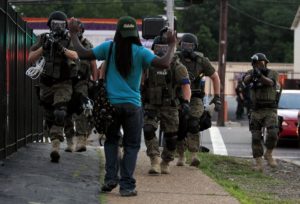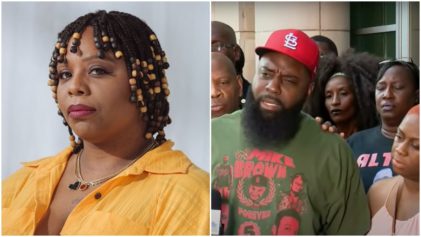
Law enforcement officials, speaking under the condition of anonymity to The New York Times, said the soon-to-be-released report criticizes the city for disproportionately ticketing and arresting African-Americans and relying on the fines to balance the city’s budget.
Just as in other cases where the Justice Department investigated police behavior against Black people, the most it will do is force Ferguson officials to either negotiate a settlement with the Justice Department or face being sued by Justice on civil rights charges.
As in the case of George Zimmerman, who also escaped charges from Justice, the Ferguson case serves as another reminder to African-Americans that it is not wise to place too great an expectation of justice on a federal government that has often been a primary player in the subjugation and large-scale incarceration of the African-American community.
But what about slain Michael Brown and his family? What about the countless number of Black people in Ferguson who have been profiled for years and stuck in prisons for indeterminate amounts of time for no just cause? What about the massive fallout after Wilson killed the unarmed teenager?
The Justice Department’s probe into Wilson’s shooting of Brown found no “sufficient” evidence to charge him. In December, the Justice Department found no reason to charge New York police officer Daniel Pantaleo in the choke-hold death of Eric Garner, which was captured on cell phone video. Last month, Zimmerman, who killed unarmed teenager Trayvon Martin in Florida, was found to not have violated Martin’s civil rights.
The pattern is blatant and disturbing.
Outgoing attorney general Eric Holder received criticism for his remarks in the summer after a visit to the distressed town.
“I wanted the people of Ferguson to know that I personally understood that mistrust,” Holder said at the time. “I wanted them to know that while so much else may be uncertain, this attorney general and this Department of Justice stands with the people of Ferguson.”
He added that the investigation would be fair and independent. “I’m confident people will be satisfied with the results,” he said.
That part, he might not be so accurate.
The report, to be released in coming days, will describe the tension between the mostly Black town and the mostly white police department. The investigation reportedly focused on the practice of excessive for and disproportionate jailing of African-American citizens for traffic stops.
Black people accounted for 86 percent of traffic stops in 2013 but make up 63 percent of the population, according to the most recent data published by the Missouri attorney general. And once they were stopped, Black drivers were twice as likely to be searched, even though searches of white drivers were more likely to turn up contraband.
These traffic stops and subsequent arrests turn into significant jail time and debts because of the mounting fines, which are Ferguson’s No. 2 source of revenue. Sales tax is No. 1. Federal investigators say that has provided a financial incentive to continue law enforcement policies that unfairly target African-Americans.
Ferguson’s case is sadly similar to that of city of Clanton, Ala., which was cited to have run a debtors’ prison. A lawsuit says city officials there keep poor people in jail simply because of their inability to pay fines.
“Because such systems do not account for individual circumstances of the accused, they essentially mandate pretrial detention for anyone who is too poor to pay the predetermined fee,” wrote Vanita Gupta, the top civil rights prosecutor at the Justice Department, who is also supervising the Ferguson inquiry.
President Barack Obama has said the people of Ferguson “have deep roots in many communities of color who have a sense that our laws are not always being enforced uniformly or fairly.”
Holder has called for more complete record keeping on the number of police shootings and how often officers are themselves shot at. FBI Director James Comey, in a bold speech last month on race and law enforcement, said police officers may be informed by unconscious biases and tempted by “lazy shortcuts of cynicism.”
“We must better understand the people we serve and protect, by trying to know deep in our gut what it feels like to be a law-abiding young Black man walking down the street and encountering law enforcement,” Comey said.


